11 Effective Home Remedies For Sensitive Skin
Keep your skin free from irritation with cucumber, mango, potatoes, cocoa powder, and more.

Image: iStock
Sensitive skin is a common skin type that may experience symptoms like redness and itching frequently. People with sensitive skin also experience burning, stinging, and itching of skin regularly. Thankfully, there are some home remedies for sensitive skin that can help you regulate these issues. You can easily treat sensitive skin by following a few DIY steps. However, this type of skin can sometimes point toward a more serious underlying condition, such as renal disease. So, it is always a good idea to consult a doctor. In this article, we have discussed everything about sensitive skin and how to treat it at home. Take a look!

In This Article
Best 11 Home Remedies For Sensitive Skin
1. Keep Yourself Hydrated

You have to drink water but in moderate quantities. Water is essential to keep your skin hydrated and moisturized from within. It also helps in flushing out the toxins (1). Drink a minimum of 2 liters of water. You can also take the help of fresh fruit juices, smoothies, green juices, and green tea to keep up your moisture levels.
2. Keep Track Of Your Allergens
Allergy and sensitive skin are arch-rivals. Scorching sun, pollutants, smoke, dust, pollen, tar, petrol, cosmetics, food items – the list goes on. Sun is the biggest enemy of skin; tan and sunburns are quite common. Dust also leaves you with rashes, as do certain face washes and face masks so it’s better and safer to use hypoallergenic, non-toxic, and fragrance-free products. Make a note of what affects your skin and stay away from them instead of searching for a solution every time you encounter the problem (2).
 Quick Tip
Quick Tip3. Moisturize With Coconut Oil
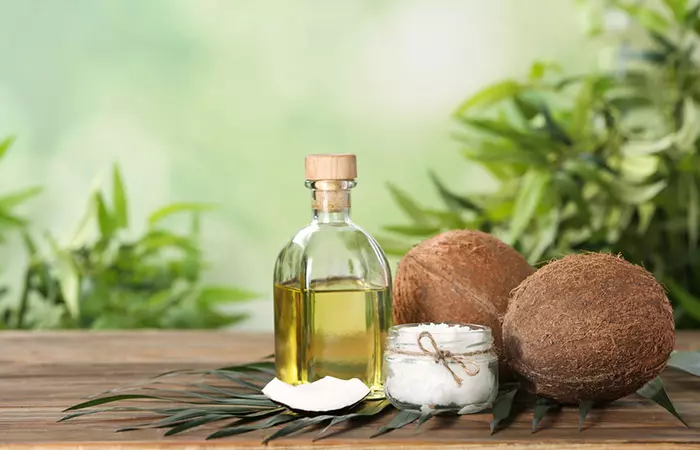
Pure coconut oil, when applied on the skin, penetrates deeply into the pores, nourishing and moisturizing from within (3 ).
Dry roast 10 black peppercorns. Heat about 1 liter coconut oil in a deep pan, add the crushed peppercorns with 3 to 4 dried Indian gooseberries, 10 curry leaves, and a handful of henna leaves. Steep it for about 10 to 12 minutes or until oil changes its color to black and gives a nice aroma. You can also explore home remedies for allergies that combine coconut oil with calming essential oils like lavender and calendula to soothe inflammation. Store this oil and use it daily to massage your skin. Along with moisturizing the skin, it will give your skin an enviable glow too. You can use the same oil to moisturize your dry scalp to prevent hair fall.
Aviva, a blogger, shared how she came to use coconut oil for her skin and hair, and how amazing it was for her. She writes, “Hurray, because my face didn’t develop horrible cystic acne all over like others warned! As a matter of fact, I rarely break out anymore.” She also outlines how the oil has blessed her skin as well, stating, “Coconut oil definitely saved my skin from dryness. Lotions, which are water-based, only temporarily relieve dryness. With coconut oil, however, my skin is constantly soft and smooth. Furthermore, it is the only product to have improved my keratosis pilaris and softened my calluses (i).”
Note: Coconut oil is comedogenic and may clog pores, leading to acne. Therefore this remedy is not recommended for those with acne-prone or oily skin.
4. Include Amla In Your Diet
Amla or Indian gooseberry is a rich source of vitamin C
(4). Clean, steam, and eat one amla a day to give your skin that extra dose of nourishment. Alternatively, you can start your day with about 60 ml of organic Indian gooseberry juice. Add 150 ml of warm water to it and drink it. 12 weeks is what you need to see visible differences. You can add honey as it tends to be a little bitter, but plain juice is always more beneficial. Want some instant radiance? Mix 1 tbsp each of amla juice and honey, apply on your face and wash off with lukewarm water after 20 minutes. This is one of the effective home remedies for sensitive skincare.
5. Benefits Of Honey
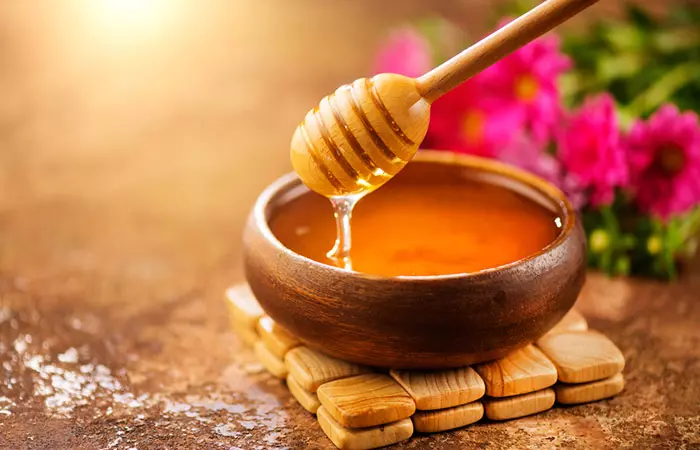
Honey is known for its anti-inflammatory, antibacterial, and antiseptic properties (5). A super hydrating tonic, you can use it as a regular cleansing agent when mixed with one glass of water. Make a coarse mixture of unsweetened cocoa powder and honey. Add coconut or jojoba oil and milk to make a wonderful scrub for sensitive skin. This mixture can also be used as a calming face mask. Apply on the face and wash off with lukewarm water after 20 minutes. Honey also heals your sunburns. Just dab on the affected area and wash off after a while.
6. Sugar
Sugar is not good for your waistline but is definitely good for your sensitive skin. White, granulated sugar can be transformed into a gentle, non-irritating exfoliating agent by mixing it with a little olive oil. Even better, coarsely powder the sugar and then prepare your scrub (6). Massage gently, in circular motions to eliminate dead cells, and rinse with lukewarm water. You can dab a little coconut oil to trap the moisture once you are done.
 Quick Tip
Quick Tip7. Cool It Off With Cucumber

Cucumber is my favorite salad veggie. It is equally important when it comes to soothing my puffy eyes loaded with dark circles. Along with repairing your skin gently, cucumber also softens it (6). Remove the peel, cut it into thin slices, and keep it on your eyes to remove the fatigue and ease the dark circles. They also soothe the ungainly crow’s feet and fine lines that can make one look older. Mix 2 tbsp cucumber juice with 1 tbsp honey to give your skin the nourishment it requires. You can store this, and use it as a refreshing face wash. You can also use cucumber juice alone on your face to brighten it up. One of the coolest home remedies for sensitive skin on face.
8. Go Chocolicious
By chocolicious, I mean cocoa powder. Unsweetened cocoa powder is my skin’s new best friend! Packed with antioxidants, it helps to keep my skin looking younger and fresh (7). Mix 5 tbsp cocoa powder with 5 tbsp honey, 2 tbsp milk, and 1 tbsp chicory-free coffee powder. This mixture acts as an exfoliating agent as well as face mask. You can apply it on your whole body, twice a week, to tighten and brighten your skin. It is a good way to ease the appearance of cellulite too.
9. Mangoes

One reason I look forward to the summers is because of this yummy fruit. The moment I can lay my hands on them, I just grab half a ripe mango to make a homemade facial out of it. Mangoes not only are tasty to eat but also nourish and hydrate your skin making it look bright and radiant as they contain folate and vitamin E. No wonder, mango butter is found in many skincare products (8).
To get its benefits at home, extract the pulp of fresh mango. Blend it with yogurt, rose water, and honey to make a smooth paste. Add a few drops of almond or coconut oil to this mixture. Apply it on your face and wash off after 20 minutes for a fabulous facial. Dry the mango skin, powder it, and store it. Mix it with cream or yogurt to be used as a face pack when you need one.
10. Potatoes For Sensitive Skin
Potatoes might not be a good choice when it comes to your diet, but you can certainly apply it topically to give your skin a new lease of life (9).
Discard the peel, grate it finely, and mix it with honey to be used as a mask for dry, sensitive skin. Keep the mask for 15 minutes before washing off with lukewarm water. Potatoes are natural skin lightening agents and can remove dark spots and blackheads. Thin slices of these starchy veggies can be placed above the eyes to bid adieu to dark circles. Prepare a mask by mixing 2 tbsp of raw milk with 1 finely grated medium potato and a few drops of almond oil. Apply this on your face and wash off after 15 minutes with cold water for radiant sensitive skin.
11. Lactic Acid
Lactic acid is an alpha hydroxy acid derived from milk. It is known for its gentle exfoliating properties, making it suitable for sensitive skin. Unlike stronger acids, lactic acid is a milder exfoliant that removes dead skin cells and improves cell regeneration rate without irritating the skin. It also improves skin texture, reduces hyperpigmentation, boosts skin hydration, and promotes brighter and radiant skin (10), (11).
Start with a concentration of 5%-10%, once a week. If no issues arise, gradually increase the frequency to twice or thrice a week. Always ensure you do a patch test before using the product. You can incorporate gentle cleansers or moisturizers containing lactic acid into your skincare routine to reap its benefits.
Sensitive skin is a common condition. According to a systematic review of studies with 51783 individuals, 71% have self-reported sensitive skin. Of these, 40% have very or moderately sensitive skin. Although both women (45%) and men (33%) seemed to have sensitive skin, women tended to have a higher risk of developing it compared to men with a risk ratio of 1.74.
While these home remedies may soothe sensitive skin, remember, prevention is always better than cure. Scroll down to learn some simple tips that can help prevent adverse reactions for those with sensitive skin.
Prevention Tips for Sensitive Skin
If you have sensitive skin, here are a few things you should keep in mind to manage it well:
- Always perform a patch test before using any new ingredient or product to check for allergic reactions.
- Opt for mild, hypoallergenic, and fragrance-free products that do not irritate the skin.
- Always read the ingredients label before buying a product. Avoid products that contain allergens.
- Moisturize regularly to keep your skin hydrated.
- Avoid over-exfoliating to prevent irritation and redness.
- Avoid hot water, as it can dry out and irritate sensitive skin. Instead, use lukewarm water.
- Protect your skin from the sun’s harmful rays with a broad-spectrum sunscreen with SPF 30 or higher.
Key Takeaways
- To stay hydrated and help your body remove toxins, increase water intake in the form of juice and smoothies.
- To hydrate it and give it a dewy appearance, use coconut oil. However, do not use it on oily or acne-prone skin.
- For an extra boost of vitamin C nutrition for your skin, drink the combination of warm water and amla juice in the morning.
- Face masks made of honey or mangoes can hydrate your skin, reduce inflammation and sunburns, and give you a radiant glow.
Infographic: 5 Simple Ways To Manage Sensitive Skin
Itching, redness, and burning are commonly experienced by people with sensitive skin. While these are not harmful symptoms, they sure can cause a lot of distress. The solution? Well, making simple and positive changes to your skin care routine and lifestyle can help. Check out the infographic below to learn more.
Some thing wrong with infographic shortcode. please verify shortcode syntaxIndividuals with sensitive skin may frequently experience symptoms such as redness, burning, itching, and stinging sensations on the skin. Applying home remedies for sensitive skin may bring relief from these symptoms and help regulate these issues while some might help promote healing. Further, follow effective beauty tips for sensitive skin such as hydration, protection, moisturization, and choosing natural and gentle ingredients for skin care, as all of this can make a huge difference. You can also use other ingredients like chamomile, oatmeal, rose water, witch hazel, turmeric, yogurt, and apple cider vinegar to help nourish, soothe, and maintain your sensitive skin. For instance, it is important to avoid allergens and pollutants like dust, smoke, pollen, petrol, tar, cosmetics, allergens in food items to prevent flare-ups and breakouts. Exposure to sunlight without sunscreen is again a big no-no. You should also opt for natural moisturizers like coconut oil, shea butter, and honey. It is important to keep in mind that sensitive skin may indicate an underlying condition, so if you continue to have sensitivity issues, it is advised to consult a doctor.
Frequently Asked Questions
Why is my skin so sensitive?
The skin becomes sensitive when it is overly dry or has some disorders like eczemai A chronic medical condition that weakens the skin barrier function to cause dry, itchy and flaky skin with inflammation and soreness. , dermatitisi An umbrella term for uncomfortable skin conditions like rashes, inflammation and itchiness after coming in contact with allergic substances. , or rosaceai A chronic inflammatory skin condition that causes small pus-filled blisters and swelling on the face as well redness, especially faced by women with fair complexions. . As a result, it is more prone to inflammation.
Is aloe vera good for sensitive skin?
Aloe vera is suitable for sensitive skin as it helps soothe and moisturize the skin.
Is lemon good for sensitive skin?
Lemon can cause skin irritation if you have sensitive skin. Therefore, use small amounts of it on your sensitive skin after doing a patch test.
Will sensitive skin go away?
Sensitive skin does not go away on its own. However, you can treat it with a proper skin care routine and lifestyle changes.
Is sensitive skin oily or dry?
Sensitive skin can be oily or dry. However, it is usually dry.
Illustration: Effective Home Remedies For Sensitive Skin

Image: Stable Diffusion/StyleCraze Design Team
Check out this video to learn the top 5 home remedies for sensitive skin! Get tips on how to soothe and nourish your skin naturally.
Personal Experience: Source
StyleCraze's articles are interwoven with authentic personal narratives that provide depth and resonance to our content. Below are the sources of the personal accounts referenced in this article.
i. The Miracle That Is Coconut Oilhttps://stretchesoftedium.wordpress.com/2012/05/03/the-miracle-that-is-coconut-oil/
References
Articles on StyleCraze are backed by verified information from peer-reviewed and academic research papers, reputed organizations, research institutions, and medical associations to ensure accuracy and relevance. Read our editorial policy to learn more.
- Dietary water affects human skin hydration and biomechanics
https://www.ncbi.nlm.nih.gov/pmc/articles/PMC4529263/ - Allergy and the skin
https://www.ncbi.nlm.nih.gov/pmc/articles/PMC2515356/ - Anti-Inflammatory and Skin Barrier Repair Effects of Topical Application of Some Plant Oils
https://www.ncbi.nlm.nih.gov/pmc/articles/PMC5796020/ - Amla (Emblica officinalis Gaertn.) extract promotes procollagen production and inhibits matrix metalloproteinase-1 in human skin fibroblasts | Request PDF
https://www.researchgate.net/publication/5264666_Amla_Emblica_officinalis_Gaertn_extract_promotes_procollagen_production_and_inhibits_matrix_metalloproteinase-1_in_human_skin_fibroblasts - Honey in dermatology and skin care: a review
https://pubmed.ncbi.nlm.nih.gov/24305429/ - (PDF) Skin Care with Herbal Exfoliants
https://www.researchgate.net/publication/224892687_Skin_Care_with_Herbal_Exfoliants - Cocoa Bioactive Compounds: Significance and Potential for the Maintenance of Skin Health
https://www.ncbi.nlm.nih.gov/pmc/articles/PMC4145303/ - (PDF) Mango Butter in Cosmetic Formulations
https://www.researchgate.net/publication/331936276_Mango_Butter_in_Cosmetic_Formulations - Nutritional value and health benefits of potatoes
http://researchjournal.co.in/upload/assignments/12_117-119.pdf - Use of formulations for sensitive skin improves the visible signs of aging, including wrinkle size and elasticity
https://www.ncbi.nlm.nih.gov/pmc/articles/PMC6559254/ - Review Article: Skin Care With Exfoliation Process
https://www.semanticscholar.org/paper/REVIEW-ARTICLE%3A-SKIN-CARE-WITH-EXFOLIATION-PROCESS-Behalpade-Gajbhiye/f2970b5bdd148ccc7bb0892bab884ba26e28c8bb
Read full bio of Aakriti Arora
Read full bio of Kushneet Kukreja
Read full bio of Anjali Sayee
Read full bio of Monomita Chakraborty







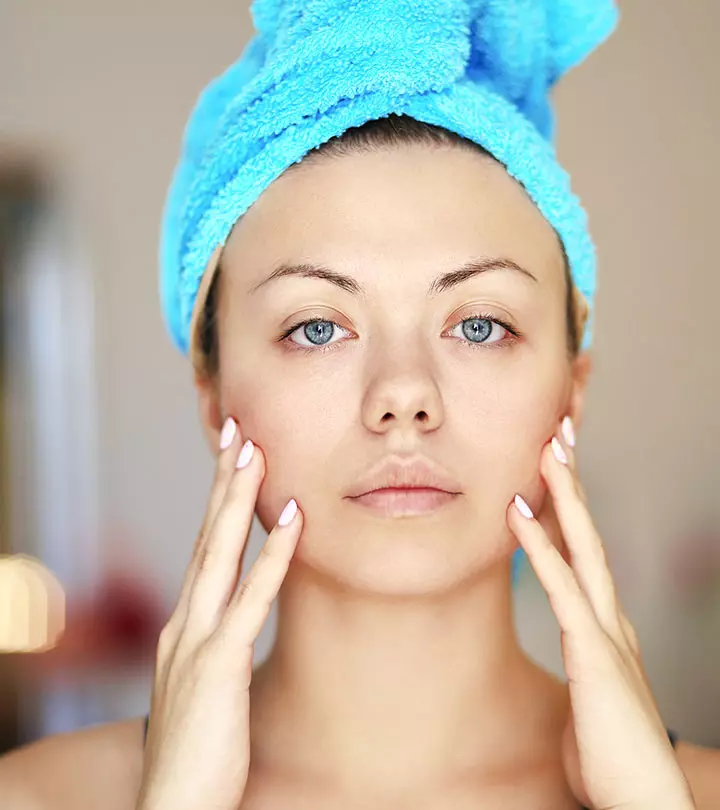

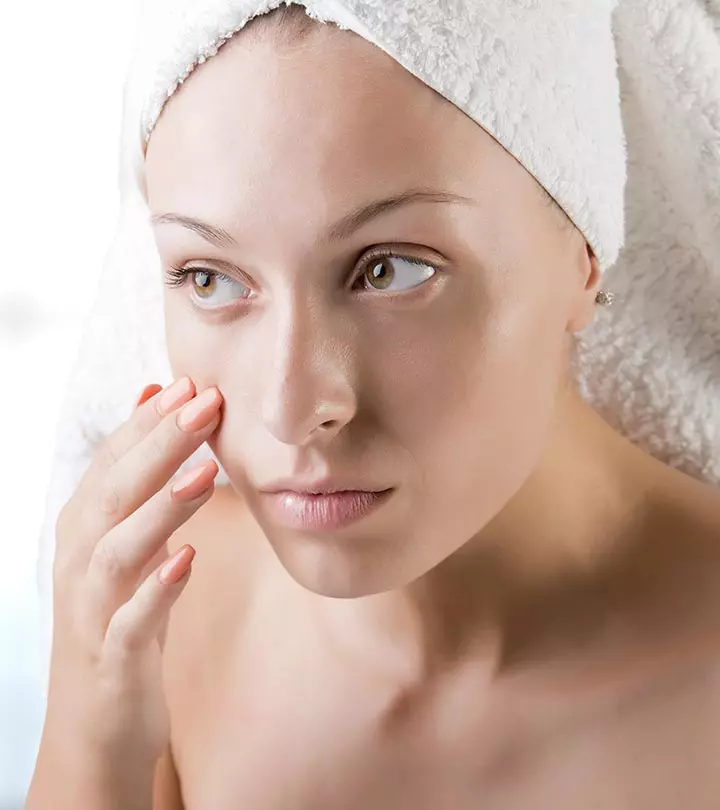



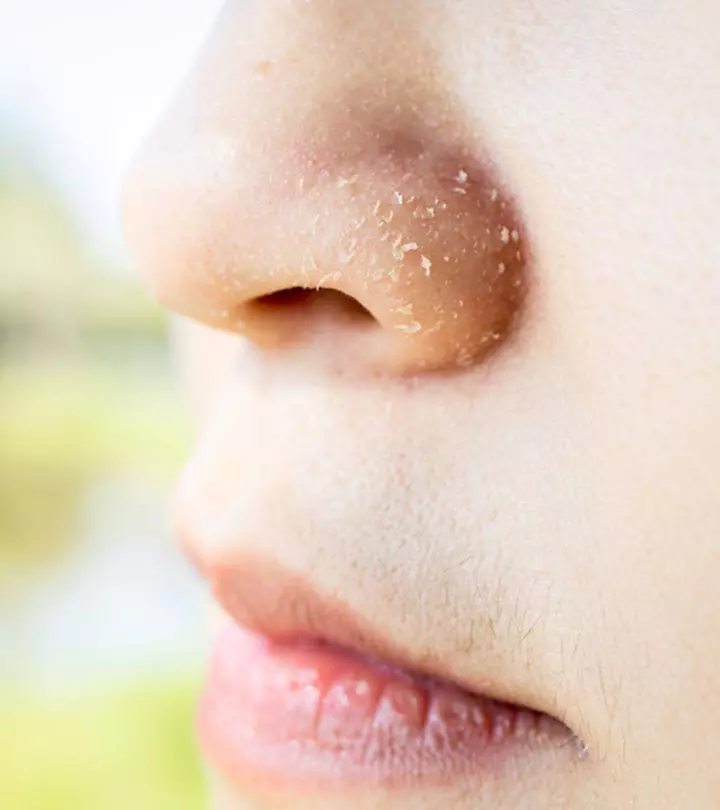













Community Experiences
Join the conversation and become a part of our empowering community! Share your stories, experiences, and insights to connect with other beauty, lifestyle, and health enthusiasts.